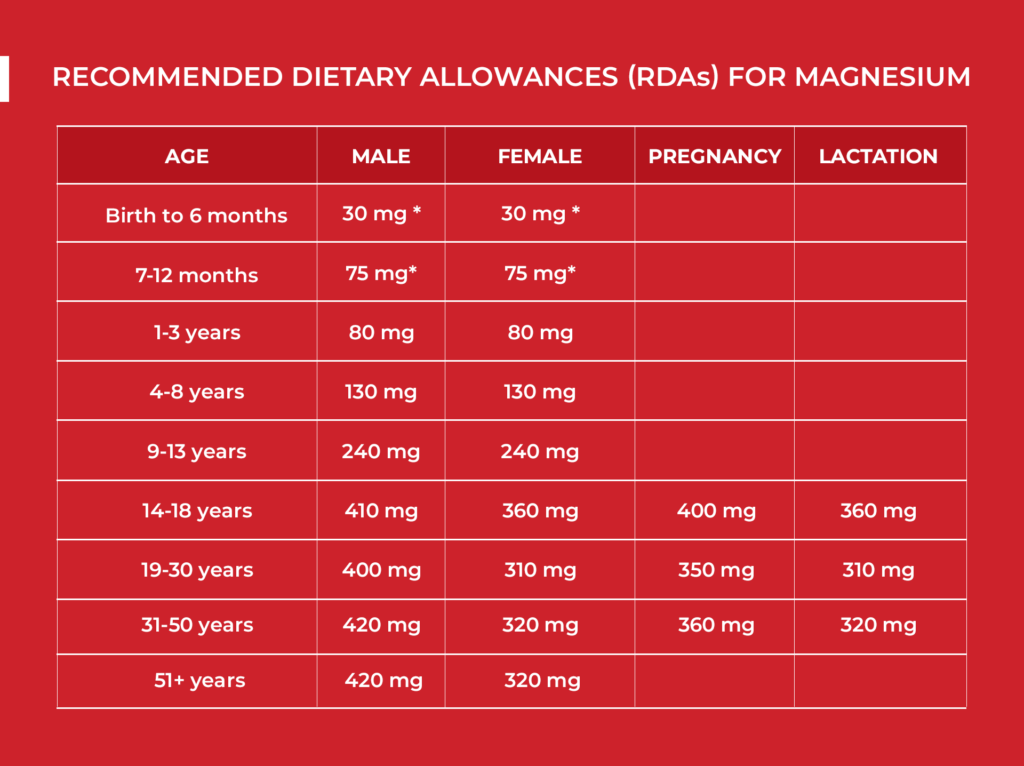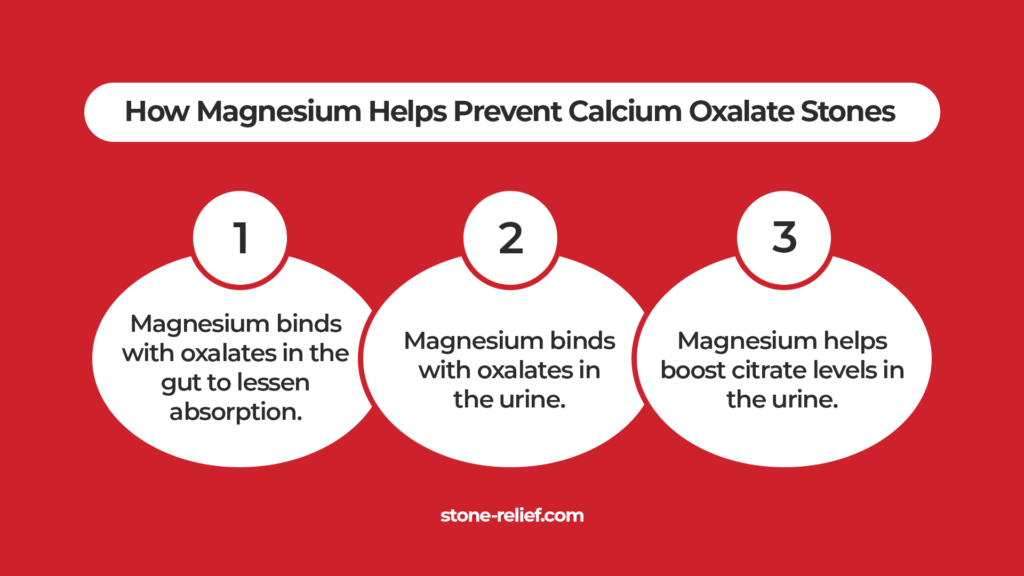Published: August 11, 2024 | 7 mins read
Magnesium Benefits for Kidney Stone-Formers
ARTICLE SHORTCUTS
- What is Magnesium?
- Magnesium Benefits in Kidney Stone Prevention
- How Magnesium Binds with Oxalates
- Will You Get Magnesium Benefits from Supplements?
- Magnesium Supplements with Other Drugs
- Best Dietary Magnesium Sources
Many of you are probably curious about this question — Does magnesium benefit kidney stone-formers?
The answer is a resounding YES! Magnesium is a key element in calcium oxalate stone prevention. We will tell you why in the following sections. For now, let’s define magnesium.
What is Magnesium?
Magnesium is an essential nutrient. It plays a vital role in many bodily functions, including energy production, DNA synthesis, and protein synthesis. It also helps create channels for ions (e.g., sodium, potassium, calcium, and chloride) to pass in and out of the cell. Here are the recommended daily intakes of magnesium based on age and sex:

Sadly, 23.5% of the US population consumes less than half of the RDA. Many people treat magnesium like a nail you see on the floor. You toss it in the trash, and yet it is an essential tool in constructing buildings or furniture.
Low magnesium levels in the blood are linked to an increased death risk from all causes, particularly heart-related issues like arrhythmias (irregular heartbeats).
Magnesium is also crucial for kidney health. A diet very low in magnesium causes inflammation and oxidative stress (an imbalance between antioxidants and reactive-free molecules), leading to damage in kidney tissues. Additionally, reduced magnesium levels can lead to more stress hormones, causing the blood vessels in the kidneys to constrict.
Magnesium is also a key player in kidney stone prevention. We will tackle this in the next section.
Magnesium Benefits in Kidney Stone Prevention
Now here’s the magic: Magnesium binds with oxalates to prevent stone formation.
In other words, magnesium sticks to oxalates long before they can bind with calcium, preventing kidney stone formation as a result. It’s like Batman putting Gotham’s crooks behind bars before they can cause havoc in the city.
One study examined magnesium benefits in the 24-hour urine of genetically modified rats. (The test’s aim was to develop calcium oxalate stones in these rats.)
These rats were fed a normal calcium and phosphorus diet supplemented with hydroxyproline (which converts into oxalates). The rats were divided into three groups of ten each. One group was given a controlled diet with 4.0 g/kg magnesium (as magnesium oxide). Another group was given a low-magnesium diet (0.5 g/kg). The last group was given a high-magnesium diet (8 g/kg). After 6 weeks, calcium oxalate risk increased in the rats that were given the low-magnesium diet. Meanwhile, it decreased in the rats whose diet consisted of high magnesium levels.
Another study with patients given 500 mg of magnesium (as magnesium hydroxide) showed a favorable result. When combined with citrate (which binds with calcium), calcium oxalate stone recurrence decreased by 95%. Magnesium and citrate are like the dynamic duo Batman and Robin!
But how does magnesium deal with oxalates exactly? The next section will give the details.
How Magnesium Binds with Oxalates
As mentioned earlier, magnesium binds with oxalates. The following will give you a clearer picture:
1) Magnesium binds with oxalates in the gut, preventing oxalate absorption.
2) Magnesium binds with oxalates in the urine, reducing its interaction with calcium.
Besides being absorbed in the intestines, the kidneys regulate magnesium levels. The kidneys filter around 2,400 mg of magnesium daily, 95-99% of which goes back into the bloodstream. This mainly occurs in the thick ascending limb of Henle’s loop (U-shaped structure) and the lower segment of the kidney’s functional unit (distal convoluted tubules).
When magnesium intake is low, the kidneys compensate by absorbing back more magnesium to prevent a significant drop in magnesium levels in the body. This is achieved by increasing the production of magnesium transporters. So, when magnesium intake is low, less magnesium will end up in the urine. Make sure to get enough magnesium daily.
Here’s a bonus — Magnesium also binds with citrate to prevent the kidney from absorbing it back into the bloodstream. That means magnesium can increase citrate levels in the urine!
When citrate levels are high, you can get extra protection against calcium-based stones. Citrate binds with calcium to stop oxalates or phosphate from binding to it.Since magnesium is essential, should you take supplements to get sufficient amounts of it? The next section will give you the answer.

Will You Get Magnesium Benefits from Supplements?
Honestly, taking synthetic magnesium supplements is not the right direction. First, the body poorly absorbs synthetic forms like magnesium oxide and hydroxide. And when you take synthetics on an empty stomach, your urine’s magnesium levels don’t improve that much. Second, magnesium supplements often cause diarrhea, making them difficult for some individuals to tolerate.
Also, one study of 82 patients taking magnesium supplements did not find a significant difference in stone recurrence rates than others. However, one study found that giving 391 mg of magnesium potassium citrate reduced calcium stone recurrence by 90%. The only challenge, still, is tolerance.
Aside from these challenges, synthetic magnesium supplements also react negatively with other drugs. The next section will explain this further.
Magnesium Supplements with Other Drugs
Some medications can cause magnesium wasting (the excessive loss of magnesium through the kidney). These drugs include diuretics, acid reducers, cancer drugs (e.g., EGFR antagonists), chemotherapy drugs (e.g., Cisplatin), immune system suppressants for organ transplant (e.g., Cyclosporine), and some antibiotics (e.g., Ciprofloxacin). These drugs can prevent proper magnesium absorption.
However, if you’re taking natural diuretics and antibiotics and eating foods with magnesium, you’re less likely to have magnesium absorption issues.
That leads us to an important question: What foods are the best sources of magnesium? We will explore this in the next section.
Best Dietary Magnesium Sources
Doctors often recommend plant-based sources or synthetic magnesium supplements. These are both wrong advice. Again, synthetic supplements can cause an upset stomach. But what about veggies?
If you are thinking about leafy greens, think again. Plant foods rich in magnesium often contain high levels of oxalates, which can counteract magnesium’s benefits.
So, eat an animal-based diet! Here are the best animal-based sources of magnesium:
- Fish (e.g., salmon, mackerel, and halibut)
- Fruits (e.g., bananas and avocados)
- Dairy products (e.g., yogurt and milk)
- Beef organs (e.g., liver, kidney, and heart)
For those using apps to track nutrients, concerns about deficiency may arise. However, the body absorbs dietary magnesium effectively. So, even if you only get around 270 mg of magnesium from an animal-based diet, you will get enough amounts to prevent kidney stones.
Anyway, if you are worried about not getting enough magnesium to prevent kidney stones, our Coaching Program can help. We will set up a dietary plan for you to make sure you are not lacking this essential protector. See you there!
Reference:
- Magnesium
- Magnesium and Kidney Health – More on the ‘Forgotten Electrolyte’
- Magnesium Decreases Urine Supersaturation but Not Calcium Oxalate Stone Formation in Genetic Hypercalciuric Stone-Forming Rats
- Magnesium in kidney stone disease: pathogenesis and treatment
- The Impact of Magnesium Supplementation on Kidney Stone FormationMagnesium therapy for nephrolithiasis

Comments or questions?
Responses
WHAT TO READ NEXT
Publish Date: July 14, 2024
Medicines That Can Cause Kidney Stones
Publish Date: April 7, 2024
Metabolic Syndrome and Insulin Resistance Impact on Kidney Stones
Publish Date: March 24, 2024
Can High Uric Acid Levels Cause Kidney Stones?